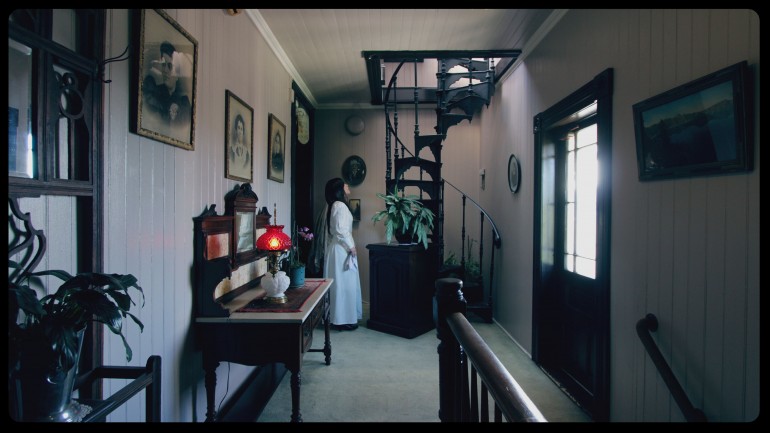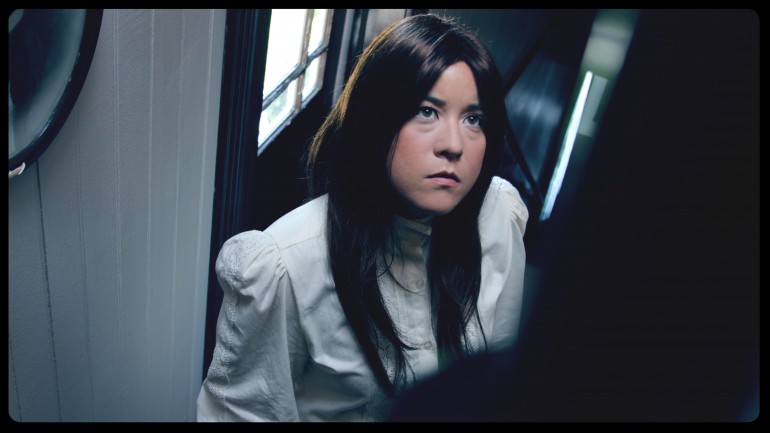Festival Q&A: H.P. Mendoza, director of I AM A GHOST
As we count down to opening night, we bring you special Q&As with filmmakers whose features will be presented at our festival this year. In this edition, Lisa Yadao speaks to director, screenwriter, actor, and composer H.P. Mendoza about Asian Americans in film, the afterlife, and balut.
Mendoza, who has not one, but two features screening at our festival: YES, WE’RE OPEN, which he wrote and stars in, and I AM A GHOST, his second film as director.
You’re sort of a jack-of-all trades. What do you consider yourself first and foremost?
I consider myself a director, first, but that’s for easy consumption so I don’t have to get into the whole “writer-director” thing. I pride myself in my writing, but I love directing my own work.
Was there ever a point early in your career when you thought or were told you couldn’t do it all?
I’m always told that I can’t do it all, and I always respond by saying “I don’t do it all; I’m a horrible caterer.” All joking aside, I never intend to do everything. I just love doing it! I love writing, directing, scoring, and editing, and if I can fill more than one of those roles on any given project, I’m a happy man.
Being Asian American, did your parents urge you to pursue something more practical? Or have they always encouraged the arts?
I was very lucky. Sure, as a kid, my parents thought I’d be a lawyer, but they always took me to the movies. And I’d always go home to try to recreate those movies with a Super-8 camera. Mostly just The Wizard of Oz with my stuffed animals and Transformers. (Megatron was the Tin Man.) When I told my mom I wanted to make movies when I grew up, she said, “You’re American, baby. You can be anything you want.”
You went from directing a musical film to working on I AM A GHOST. Why the drastic change and have horror films always been something you wanted to do?
I’ve always loved, loved, loved horror films. I remember watching a double-feature of Nightmare on Elm Street 3 and Creepshow 2 and relishing the roller coaster that we were on. I never thought of myself as a “musical” guy until I wrote one. But I always wanted to do darker films, whether they were comedies or not.
What are your favorite films and who are the directors you look up to?
My top films always seem to change, but the list always seems to have Picnic at Hanging Rock, Dog Day Afternoon, Citizen Kane, Mulholland Drive, Persona, Akira, West Side Story, and The Texas Chainsaw Massacre. Ask me again and my answers might change. Muriel’s Wedding might be on that list.
My favorite directors run the gamut, too. I love Orson Welles, Ozu, Bergman, and Robert Wise, but a bunch of my favorites come from the 70s. Kubrick, Scorsese, John Waters, Sidney Lumet. I’m really loving Tarantino, P.T. Anderson, and Edgar Wright, too.
You’ve got a rom-com that’s also screening at this year’s festival, YES WE’RE OPEN. Why another genre switch?
I love what romantic comedies used to be, but I don’t like what they’ve become. It’s obvious to say that they’re trite or saccharine. My beef is that it’s been decades since Annie Hall, but if you watch the rom-coms of today, you’d swear we went back into the 50’s. Everything is so morally coded. A character cheats? Must be punished. A man is engaged to his fiancée and falls in love with another woman? That fiancée better be racist, classist, or just plain mean. For the freedoms we have, post Hays Code, we sure do adhere to the values of Doris Day and Rock Hudson.
What have been the biggest differences for you between directing a lighter film and one with darker themes?
I don’t think the tone of the film makes the directing experience that different. In both instances, I’m relishing the act of creating a scene that impresses me. In Fruit Fly, I remember standing behind the monitor watching L.A. Renigen approach Mike Curtis, full of guilt for the way she’d treated him in a previous scene. When they finally make eye contact, there’s a silent exchange that looks like their friendship may be damaged when suddenly Mike hugs her and they both sigh with relief. When I yelled “cut”, I felt like we’d all done something good. That feeling of satisfaction was no different from the giddy pride I’d feel after any of the disturbing or macabre scenes we’d accomplish on I AM A GHOST. I just want to be able to step back and say, “now that feels like a movie.”
For casting, how does the Asian American actor factor in? Do you write specifically with Asian American characters in mind? How important is it for you to collaborate with other Asian Americans?
I’ll be honest, I don’t generally write with Asian American characters in mind the way someone like Bryan Lee O’Malley does. But I kind of like forcing Asian faces on people. A producer once said to me, in front of a group of people, “H.P., you’re a talented guy, but Asian faces don’t sell.” He was talking about Fruit Fly. It sold. I win.
As far as collaborating with other Asian Americans, I don’t do it on purpose, I just have a lot of Asian American friends. I’m more concerned with getting the Asian American face on the screen. I know that I have a bunch of scripts that call for white characters (and I won’t shoehorn racial identity politics into those films) but visibility is important to me and I want to prove to people that Asian American faces do sell.
Without giving too much of I AM A GHOST away, a stark choice of sex and gender appears later in the film. Was this an intentional choice and why?
Hmm…yeah, I don’t want to give too much away. Let’s just say that, on top of sneaking Asian faces, voices, and culture into a Victorian period piece, I wanted to sneak sexuality and gender identity in, as well. Yes, the photographs of the sailors in Emily’s sister’s bureau are homoerotic. Why? Good question. Add that the list of questions you’d have at the end of the film. I’ve watched numerous groups of festival goers ask each other these questions after the film and come to their own conclusions and interpretations. I’m glad that the film isn’t so oblique that it’s inaccessible and academic, but I’m glad that everyone has been willing to put in the effort to piece the puzzle together.
Do you believe in the afterlife and ghosts?
I’m an atheist, but I love the idea of an afterlife. Being Filipino, I grew up with tons of ghost stories and I really wanted to write one of my own from a perspective that speaks to my sensibility.
What’s your next project?
It’s called Bitter Melon. It’s one of those Christmas comedies in which the family gets together for the holidays and “hilarity ensues”, only the hilarity in question comes from the entire family conspiring to murder the black sheep of the family.
Any plans on conquering Broadway?
Nah, Broadway doesn’t interest me. There’s something about big theater that always disappoints me. I mean, of course I want to see The Book of Mormon, but in a culture that’s divided between the folks that want more Miss Saigon and the folks who want more Rent, I feel like I’d never make anything that anyone would like. And honestly, whenever I hear people say that they thought Wicked: The Musical is better than the book, they sound like the people who think that Empire Strikes Back is the worst Star Wars film because it’s the “boring” one. And that’s just bad.
Seriously, when I go back to making musicals, it will be on my terms and they will be for movie-going audiences. I want to write a musical about Sarah Palin. I want to write a musical about Reverend Fred Phelps. I want to write a musical about fetishes and retro-futurism. The list goes on.
One final question for the Pinoys: have you ever eaten balut, and if so, did you like it?
I LOVE balut! I grew up eating it. My partner and I actually have a semi-regular event called the Balut Supper Club, and it started as a bunch of friends making “weird food”. This was the inspiration for the dinner scene in Yes, We’re Open. One day, the Balut Supper Club will see the film. And then we’ll have an orgy.








Join the Conversation